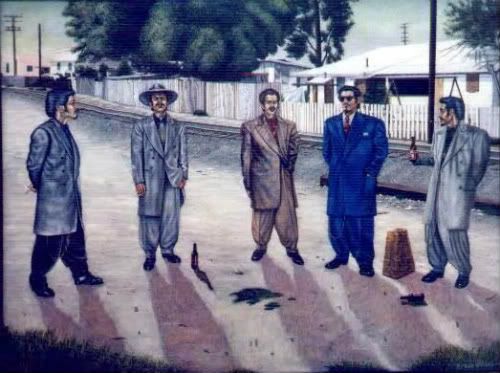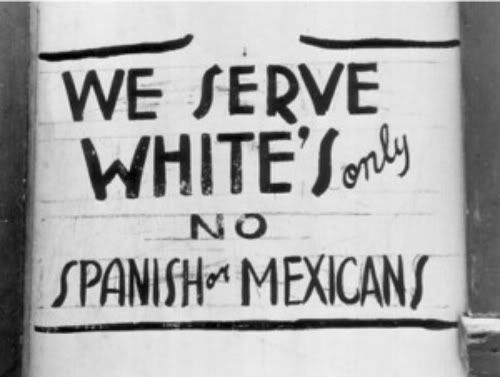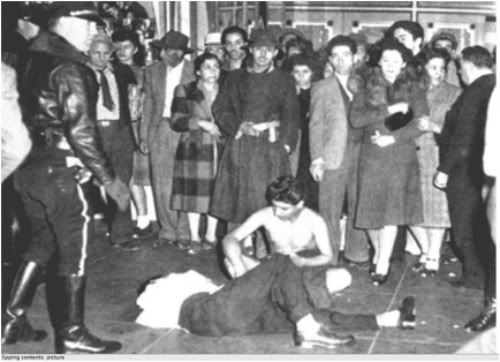--Catherine S. Ramirez, The Woman in the Zoot Suit

Pachucos, by Emigdio Vasquez
Last night, I was at a bar in downtown Fullerton, and I started asking some of my Mexican-American friends, both employees and patrons, if they had ever heard of "pachucos," zoot-suit-wearing Mexican-American hipsters from the 1940s and 1950s. I was curious because I've been researching local history and reading about pachuco culture, and I wanted to talk about it.
Out of about six people I asked, only one guy knew what I was talking about. he was dressed in semi-baggy "cholo" style clothes.
"Los pachucos," he said, smiling, "Zoot suiters." But he was on his way out, and that was the extent of our conversation.
Today, while working in Hibbleton Gallery, I finished reading the book The Woman in the Zoot Suit by Catherine S. Ramirez, which is about "pachucas," the female counterparts of the pachucos, and their cultural significance as forerunners and icons of the later Chicano/a Movement of the 1960s and 1970s, which continues today.
As I sat down to write about this stuff, who should walk into the gallery but Fred Ortiz, who owns a sprinkler business on Santa Fe St. next to our gallery. He also owns one of the largest private collections of Chicano art in Fullerton, including work by the famous Emigdio Vasquez, who painted pachucos and other aspects of Mexican-American culture.
What an amazing coincidence! I asked Fred if I could interview him about pachuco culture, and we ended up talking for about an hour. It was awesome.
Fred grew up in East LA and his parents lived there during the days of the pachucos.
"Being a Mexican-American in Los Angeles in the 1940s was kinda like being black," he said, "There was a lot of prejudice."
"What kind of prejudice?" I asked.
"Well, for example, if you were Mexican and you tried to get a job somewhere, people might tell you, 'We don't hire niggers, Mexicans, or dogs,'" he said.

"That's crazy. I've been reading dfferent accounts of the pachucos and, depending on what you read, they were either vicious gang members, or iconic heroes of cultural identity and solidarity. What's your take on the pachucos?"
"It was young Mexican-American guys who wanted to create and express their own identities, and be different from the gringos. So they started wearing these baggy suits, and it evolved into a style. It was partly about being cool, which is what every young guy wants to be, whatever your race."
"But did they carry around knives and chains and terrorize people, like the newspapers said?"
"Some of them carried knives or chains, but they weren't the only ones. You had the white 'greasers' too. It wasn't like the pachucos were more violent than other youth subcultures of the time. It was more about identity and respect and being cool."
"What's your take on thee infamous Zoot Suit Riots of 1943? If you read newspaper accounts of it, you would think the pachucos were these vicious urban terrorists, beating up servicemen and raping women. I don't think that's the full story. In fact, after reading the book The Woman in the Zoot Suit, I know the newspapers were not telling the full story, that they were, in fact, quite racist."
"Based on conversations with my father, this is what I know about the Zoot Suit Riots. It started when a group of white Navy guys were cruising in East LA. They saw a bunch of Mexican guys in their fancy zoot suits, and thought it would be fun to beat them up, take off their zoot suits, and humiliate them. Mexicans were like second-class citizens at the time. Shortly thereafter, some Navy guys went back to East LA, and this time the pachucos fought back. The next thing you knew, the LA Times was running sensationalist headlines like "Zoot Suiters Beat Up and Stab Servicemen!" This was during World War II, remember. Beating up a serviceman, for whatever reason, was like treason. So a bunch of servicemen read those headlines and started raiding, terrorizing, and brutalizing pachucos in East LA. That was the Zoot Suit Riots."

"So the instigators were mainly the U.S. servicemen. That makes sense, given the climate of racism against Mexican-Americans at the time, especially ones like the pachucos, who had the audacity to look different from the dominant culture."
Fred's account of the Zoot Suit Riots matched with the accounts I'd just read in The Woman in the Zoot Suit. Talking to Fred was a real privilege and an eye-opener for me. It demonstrated the power of oral history to challenge "official" history. As is often said, history is written by the winners, or those with power. As a fledgling historian, I am far more interested in telling the stories of those without power, those on the margins of the dominant culture. In telling these stories, I think, we come to a much richer understanding of our shared past and present.

Two pachucos, stripped of their zoot suits.
